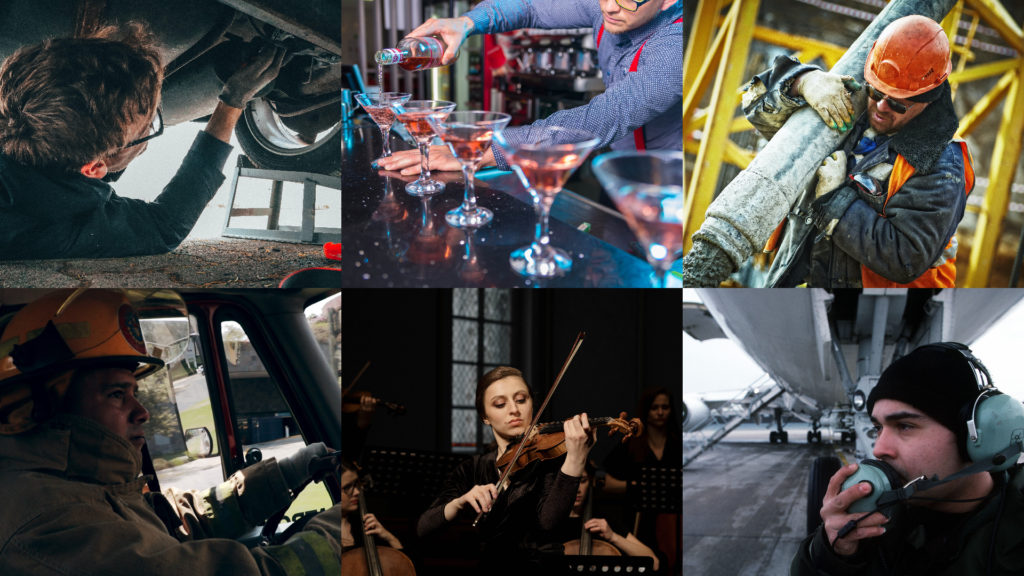
The loudest jobs and their consequences
Most of us work 8 hours per week, 5 days a week, if not more. That’s a significant amount of time! It is therefore important that we work in a comfortable and safe environment, since even the slightest discomfort could compound to something really serious over time.
When you apply for a job, what do you look for? A lot of people think about salary ranges, workplace environments, and benefits packages.
These are all very important details to consider, but one that many people don’t seem to consider, and they should, is the level of noise you can expect to endure at work?
In short, workers who face the highest levels of noise in the workplace include airport ground crew members, bartenders, construction workers, emergency vehicle drivers, mechanics, and musicians.
Noise levels in the workspace
Professions ranked from loud to loudest:
- Mechanics: 87 dB
- Musicians: 95-110 dB
- Bartenders: 115 dB
- Construction workers: 120 dB
- Emergency vehicle drivers: 120 dB
- Airport ground crew members: 140 dB
Of these six professions, airport ground crew members face the most amount of noise. While the range and intensity of noise-related consequences can impact people differently, there are a number of concerns that high levels of noise pose, especially when people are exposed to prolonged periods of noisiness.
A few examples of long-term effects of noise pollution may include tinnitus, noise-induced hearing loss (NIHL), heightened levels of stress, hypertension, and difficulty concentrating. Noise pollution in the workplace can also make it difficult for workers to listen for causes of concern, meaning the frequency of on-the-job accidents may increase because workers cannot use their sense of hearing well enough to detect dangerous sounds or keep themselves safe.
Many people overlook the noise levels associated with various professions. However, this oversight usually has more to do with a lack of information than with pure disinterest in noise pollution. In fact, some might admit that they aren’t even sure what noise pollution means in the first place.
In short: Noise pollution is a phenomenon whereby excessive or harmful levels of noise have undesirable effects on the environment, human beings, and animals. Sound is measured in decibels, or dB, and according to the World Health Organization, noise becomes detrimental at around 75 dB.
It’s fair to say that we live in a busy and bustling world full of noise galore, but just because high levels of noise seem to be normalized doesn’t mean they should be automatically accepted.
If you’d like to explore more in-depth explanations of the loudest jobs and their consequences, keep reading for additional information down below.
Examples of the loudest jobs
According to the Texas Department of Insurance:
“many experts agree that continual exposure to more than 85 decibels is dangerous.”
Texas department of insurance
With the average noise of mechanics being the lowest at 87 dB, this information means that airport ground crew members, bartenders, construction workers, emergency vehicle drivers, mechanics, and musicians endure dangerous levels of workplace noise.
Now that you have a better understanding of noise pollution and the effects it can have on the average person, we recommend taking that knowledge and keeping it in mind when considering which profession to pursue. While noise pollution does not have to be the top determining factor when choosing a job, noise levels are worth considering for the sake of your health.
Airport ground crew members

With an average noise exposure of 140 decibels (dB), airport ground crew members face some of the harshest conditions in the context of noise pollution.
In fact, noise levels are so high for airport ground crew members that the federal government has stepped in and established an official Federal Airport Noise Regulations and Programs document.
According to the Congressional Research Service, “Congress amended FAA’s [the Federal Aviation Administration] charter in 1968 to direct [the] FAA to address aircraft noise at a national level” due to the increase in aircraft usage and the subsequent elevation in noise levels back in the 1960s. Since then, the FAA has established five official stages of airplane noise levels, with Stage I indicating the loudest aircraft carriers and Stage IV indicating the quietest airplanes.
The work that the government has carried out in an effort to minimize the amount of noise stemming from airplanes as a mode of transportation is significant. However, despite the government’s efforts, airplanes are inevitably loud, and airports are noisy as a direct result of the noise pollution that aircraft cause. But even when government-mandated regulations regarding noise are adhered to, airport ground crew members can still endure dangerous levels of noise and are always supposed to wear protective gear.
Bartenders

Bartenders and nightclub personnel often deal with upwards of 115 dB of noise while on the job.
The workplace environment of bartenders is notoriously known for being loud, and customers tend to be rowdy, especially as more alcohol is introduced as the night progresses. Music is often played in bars and nightclubs as well, further adding to the noise pollution experienced by bartenders during their shifts.
The fact that bartenders need to communicate with customers also makes it very difficult for them to use any type of protective gear such as earplugs, as those would interfere with their work.
Construction Workers
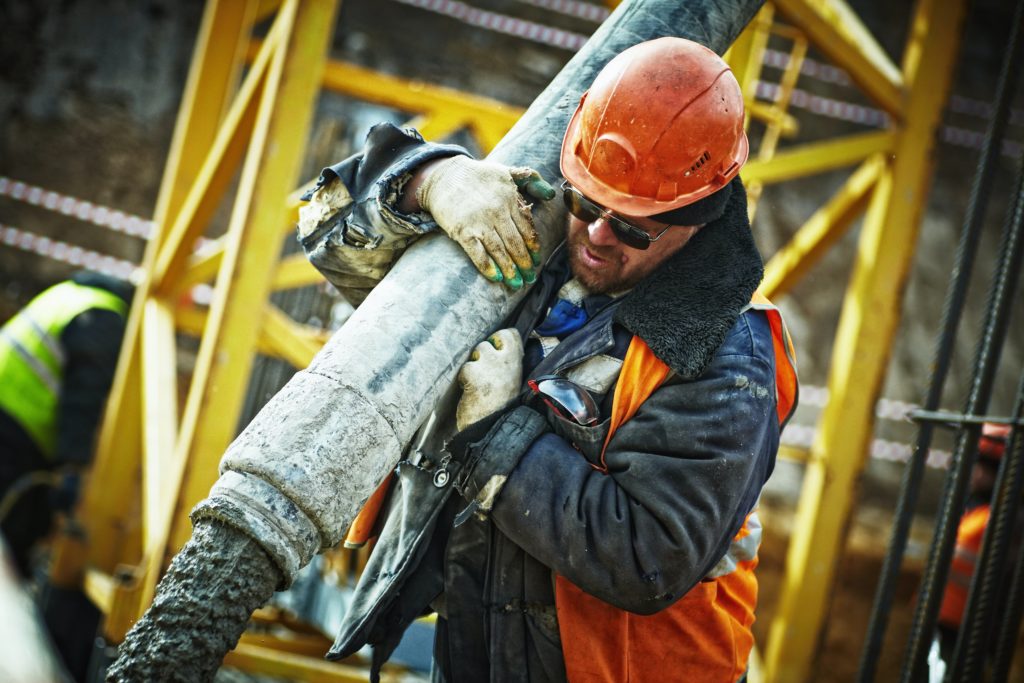
If you were to become a construction worker, you could expect to encounter an average of 120 dB of noise at work.
Construction projects sound incredibly loud when you’re simply driving by workers jackhammering on the highway or walking by teams building new apartment complexes in the city. So, if construction is loud to the average person who is simply passing by, we can only imagine how detrimentally noisy it would be to call construction sites your workplace.
Construction workers are also supposed to wear protective gear when operating loud equipment, however they often don’t, and there’s very little control over this matter.
Mechanics
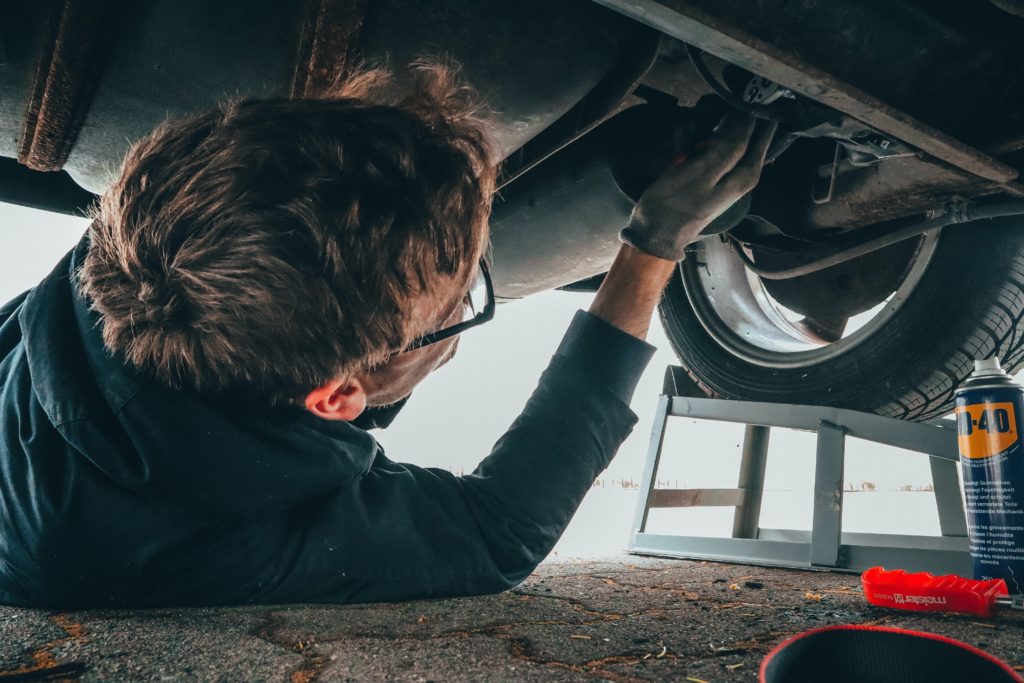
As part of their profession, mechanics listen to around 87 dB of noise while working.
Mechanics work with vehicles of all sizes, and if there is one thing combustion engines are not, it is quiet. Making repairs to vehicles, fixing broken parts, and adjusting inconsistencies are only a few of the many job responsibilities of mechanics, none of which are low-volume tasks.
While mechanics endure less noise overall than the other five jobs in this discussion, 87 dB of sound is still unsafe, especially when listened to on a regular basis.
Musicians
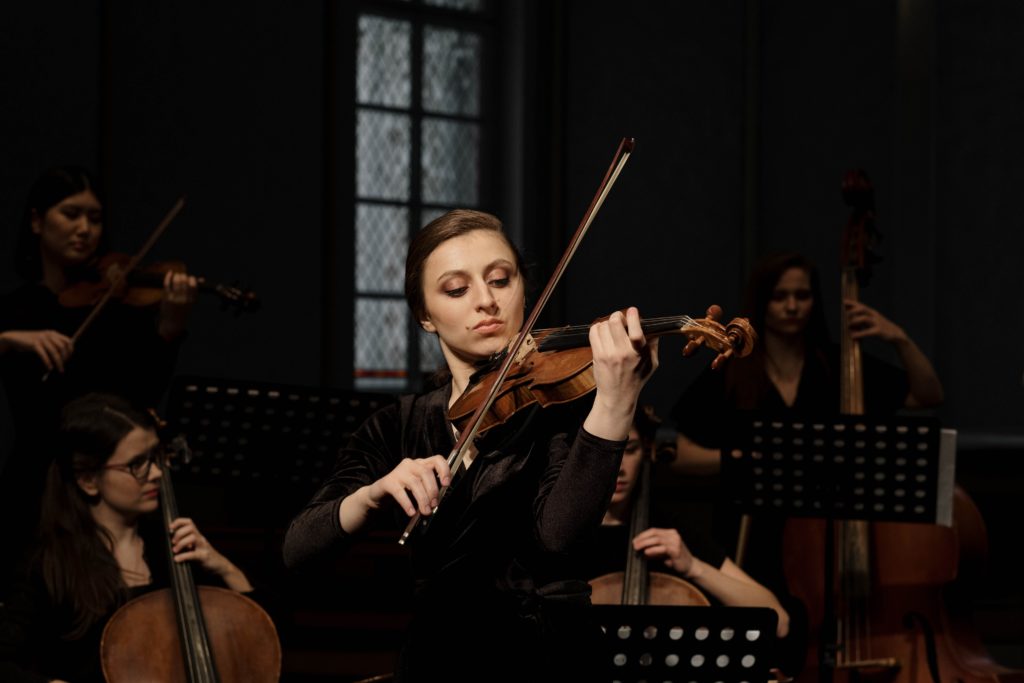
The average musician faces between 95 dB and 110 dB of sound.
The music flowing from a musician’s guitar or the lyrics being sung by a pop star sound beautiful when the volume is at a reasonable level, but imagine being the artist creating the songs.
They are right, front, and center in the midst of a lot of noise, which poses threats to them in the context of noise pollution and auditory safety. Audience members at concerts are protected from the negative impacts of noise in a way that cannot be done for musicians, so the life of a musically talented person can be a danger to their ears.
Many musicians wisely choose to use earplugs while playing their music. However, most earplugs lower the volume of some frequencies more than other, actually distorting the sounds we perceive. So musicians need to get a special kind which are custom made and lower the volume without distorting the sounds.
Emergency Vehicle Drivers
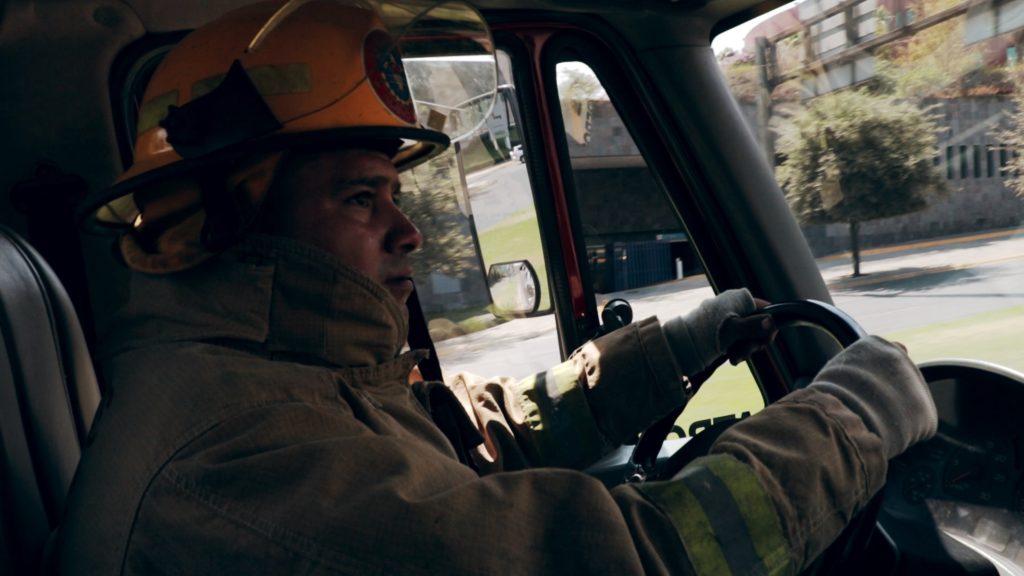
Emergency vehicle drivers who operate ambulances and firetrucks face approximately 120 dB of noise, particularly when the sirens are turned on and the vehicles are in motion.
Not only do emergency vehicle drivers have to listen to the whirring, ear-piercing sound of sirens, but the patients they transport may cry, scream, or express pain-driven outbursts, which are all factors that can negatively impact emergency vehicle drivers. Also, all of the equipment and devices that emergency vehicle drivers may need to use while on the job can further increase their exposure to additional noise pollution.
Office work environments can be noisy too
While airport ground crew members, bartenders, construction workers, emergency vehicle drivers, mechanics, and musicians work some of the loudest jobs on the market, people who work in office spaces face noise pollution in their daily lives as well.
A loud office might not cause employees permanent physical damage, but it can definitely have an impact on their performance.
Most notably, loud workspaces can be the cause of many people’s inability to stay on task or finish projects in a timely manner. Additionally, noisy offices can also result in miscommunication amongst coworkers. It might be difficult to hear one another while conversing, or the loudness of the office space could make it hard for employees to concentrate long enough to understand their peers, among other possibilities.
Furthermore, noisy offices can lead to headaches, migraines, and other significant health conditions. While these may sound like everyday ailments that people should simply grin and bear, noise-related issues, like headaches and migraines, can be exacerbated over extended periods of time and have a significant psychological impact.
And this is only the very beginning. We are so accustomed to high levels of noise that many people do not even question the amount of auditory stimuli they take in on a daily basis. Luckily, there are ways to combat noise pollution that doesn’t involve you cutting down the hours you work per week or quitting your job altogether.
What to do if you work in a noisy workplace environment
In a perfect world, noise pollution would be easy to eliminate, and it wouldn’t be a way of life that we all have to casually accept. However, in reality, noise pollution is part of our everyday lives at the moment, so learning how to live with it is the best alternative.
If you work in a noisy environment where noise pollution is extraordinarily abundant and sound levels are often high, there are measures you can take to minimize the amount of noise you are subjected to at work. For starters, you could take advantage of phase cancellation and invest in noise-canceling headphones to wear whenever possible.
However, the idea is to wear those headphones without blasting your favorite tunes or turning the volume of a podcast up as high as it will go. Doing so will defeat the purpose of noise-canceling headphones as a tool to combat noise pollution.
Also, only wear noise-cancelling headphones when it is safe to do so. As an example, if you are the sole person in the office one day, headphones could prevent you from hearing important sounds, like security bells or fire alarms, so be mindful of your environment.
Similarly, if you frequently operate heavy equipment as a construction worker, noise-cancelling headphones would not be the wisest idea. Instead, try earplugs or ear muffs. While earplugs and earmuffs will likely not drown out the noises completely, they can minimize the intensity of the sounds you encounter on an everyday basis at work, which is better than hearing all of the noises around you at full volume.
Ultimately, knowledge is power, and the more you know about noise pollution, the better you can equip yourself to minimize the impact of its consequences.

[…] encounter various types of noise daily, from occupational noises to recreational noise. Although most of these noises are moderate, studies on the adverse effects […]
[…] we age, changes within the inner ear, middle ear, and auditory nerve pathways can affect hearing. Long-term exposure to noise, certain medical conditions, and genetic factors can contribute to hearing loss. Additionally, […]
[…] The persistent question lingers: can tinnitus be cured? While we yearn for a magic wand that erases the ringing once and for all, the reality is a bit more complex. Tinnitus is caused, either by an underlying condition, or exposure to loud noise. […]
[…] This can roll into other significant health-related impacts on people, but even all on its own, hearing damage caused by exposure to high levels of noise is permanent and irreversible. This is yet another potential impact that a lack of proper acoustics […]
[…] also people who like to party often but are concerned about their hearing, professional musicians, people who work in construction, airline pilots… over the years I’ve seen a clear trend were people value silence more and more, and […]